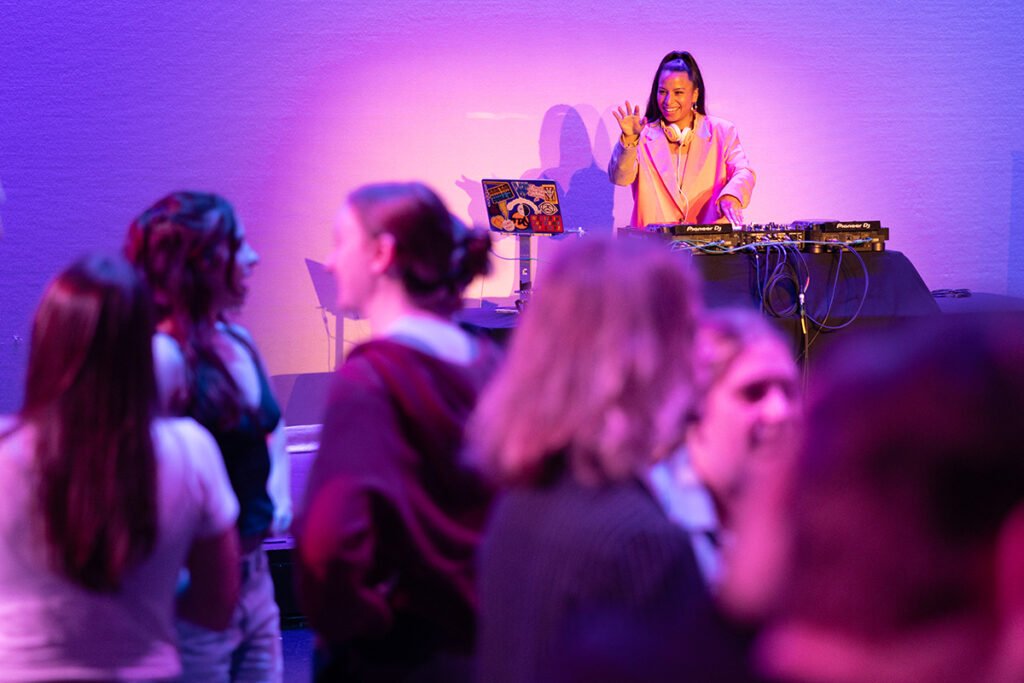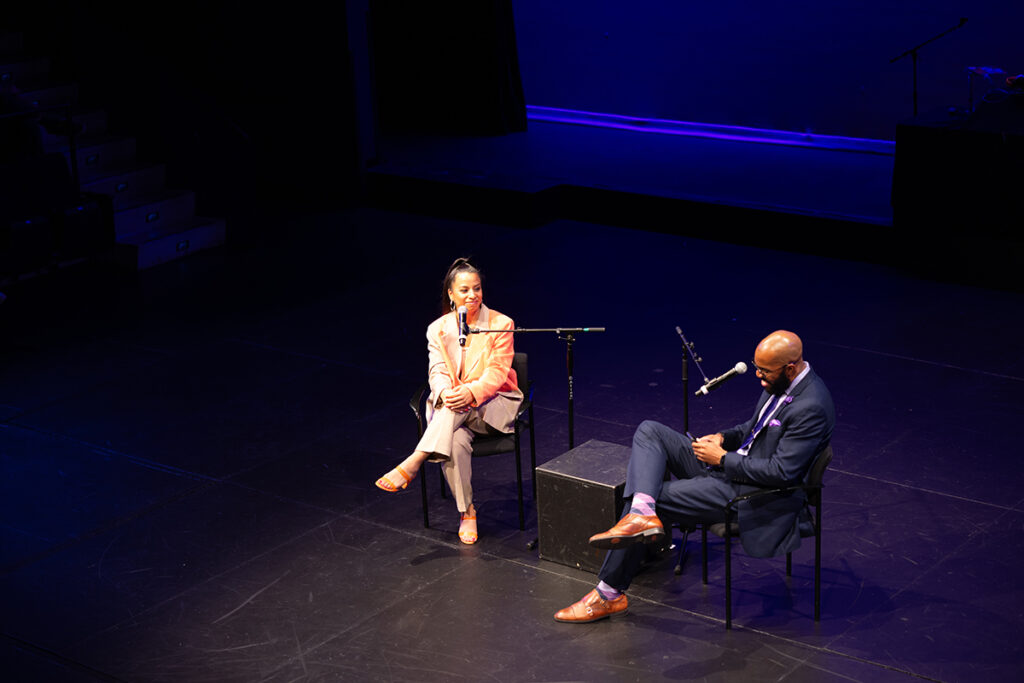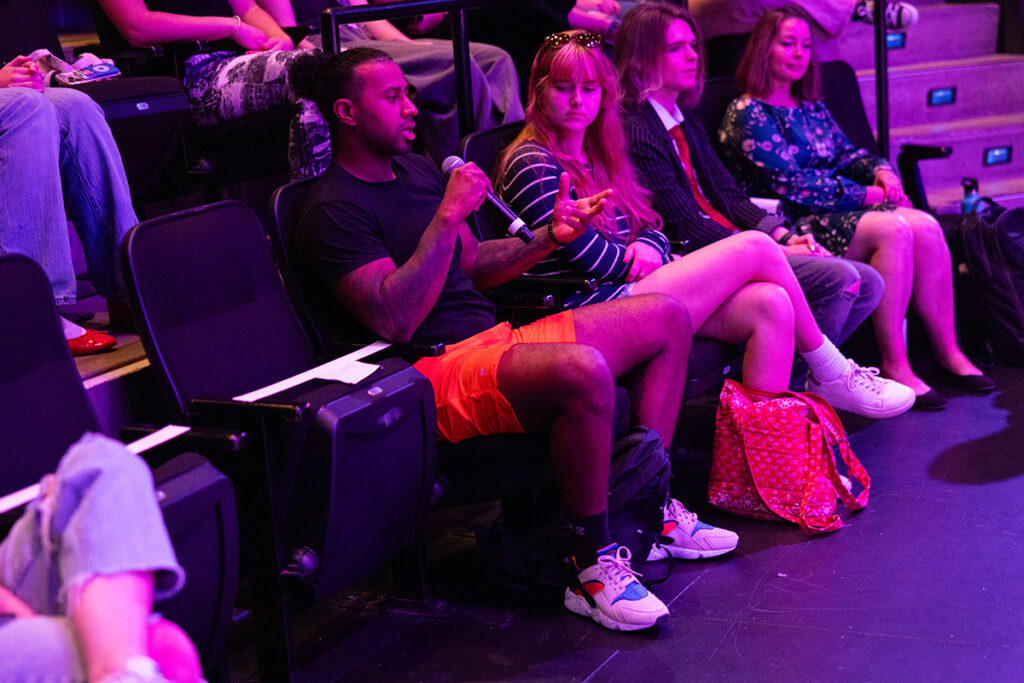DJ Jasmine Solano ‘06 on Laying Down Tracks in the Creative Economy

By Melissa Russell
DJ Jasmine Solano ‘06 was in the house last week, spinning fire tracks and sharing her insights on how to live a creative life in the gig economy while staying true to one’s spirit.
Solano, also known as Anna Sumilat, was the featured speaker at Vibing with Your Career, part of the BCE@Work series hosted by the Business of Creative Enterprises (BCE) program. Jae Williams, Marketing Communication Executive in Residence and instructor of a course on Hip Hop, Culture, and the New Economy, interviewed the DJ, music activist, cultural influencer, and Emerson alum.
Coming off of four gigs in three cities, Solano said she couldn’t wait to get back to Boston.
“Let me sit down with my people!” she said, wrapping up a hip hop set that had folks up and dancing at the Semel Theater.
Here are some insights from the conversation.
On having a stage name:
I started DJing at WERS, underground hip hop, my first year, and my DJ name was Miss Anna…. [Recently retired station manager] Jack Casey said, ‘Let’s treat this show the way other traditional radio stations treat their shows. Let’s give you a radio name, let’s give you a photo shoot campaign.’ In radio, a lot of people have fake radio names, because it is the art of the audible. We had a two-hour meeting and came up with Jasmine Solano. I think I chose Jasmine because she may have been the only Disney character that looked like me growing up. The show was called The Secret Spot, and it is still in rotation today.
When I moved to New York after Emerson, I decided to keep my DJ name because I had gotten some notoriety and some momentum, but I didn’t realize my DJ career would take off the way it did, and that I would meet a lot of people front-facing as Jasmine. So, now I have two names. People call me Anna and Jasmine all day long, but it started here at Emerson.

Anna vs. Jasmine:
Anna runs the business, and Jasmine is on stage as you just saw, jumping up and down. They are the same person, but it is nice I get to compartmentalize a bit. Anna by day, Jasmine by night. I’ve created a career based on creative entrepreneurship. With the government name, my family doesn’t have to deal with the decisions I’ve made for my artistry.
What is creative entrepreneurship?:
This ties in perfectly with the BCE program. The reason I love the title is because it explains everything I’ve done. It’s the first business degree for artists – teaching artists how to build their own brand, start their own company, the legalities, the finances, and that’s essentially what being a creative entrepreneur is. …. If you can start to gain those skill sets and understand all the different hats you have to wear to be an entrepreneur and maintain your artistry, you’re going to have one leg up.
It has a lot to do with learning about money, learning about business, about marketplace and marketing in the age of social media. It takes a lot of discipline. I always say, I’m not here to sugarcoat it – you have to be a bit militant with your time management, learning new skillsets. You’ve got to have a fire in you. It is not a linear path, not a stable path. I’m just keeping it real.
What creative entrepreneurs can learn from pro athletes:
My biggest piece of advice is if you want to be an entrepreneur, if you want to be your own boss, you have to treat yourself like a professional athlete. Professional athletes take their physical health so seriously, they take time management seriously, they don’t miss a day of practice, they have a team that supports and helps them. It takes that much. Your mental health, spiritual health, physical health has to be at 100 all the time in order to have enough energy to deal with the fluctuations of this kind of life. Social media is going to change, AI is going to change, economies are going to change. You’re going to have to pivot, adapt, reinvent yourself, fail, don’t give up, try again. These are things athletes are so good at because they’ve trained themselves.
That’s another reason I love Emerson. You are in a microcosm of opportunity. You have so many resources around you, you should be experimenting with everything and seeing what you like, seeing what you don’t like, so when you come out of this building, whatever city you go to, whatever job you go to, you’ll be like, ‘Oh yeah, I did that at Emerson.’

What does ‘influencer’ mean to you in 2023?:
I think everyone has a little bit of a different definition of influencer. I’m a Millennial, and the word ‘influencer’ has changed over my time. Influencer in 2015 was more along the lines of a cultural tastemaker. Then influencer marketing blew up into an entire field, and now an influencer is congruent with content creator. It means someone who can become an advertiser online. It has gotten played out and lost its meaning.
What I prefer is people who are cultural organizers, tastemakers who push the needle, disrupt the status quo and have actual influence. If you have a point of view, if you stand for something, a purpose, it’s a real type of influence and what you want to strive for.
On the centrality of collaboration:
I think about ‘ERS and how we were such a tight team. We had 25 different shows, I was managing 100 students, and it would not be a well-oiled machine if we didn’t have collaboration. Life is all about how you work as a team. You have to deal with personalities, meshing different cultures and backgrounds and ideologies, and you’ll still need to be able to achieve goals. If you can deal with people, you can deal with anything.
How to make your own major:
I grew up in Philly [at] a time when music was socially conscious, and I fell in love with music activism. I wanted to study it, but there was no such major anywhere. When I looked at Emerson, I realized I could design my own major. We built a triple major that was audio/radio, marketing communication, and political science. And Emerson was so liberal at the time, they allowed the title of my major to be “The Music Activism Quest”. I named my major like a mix tape!
Eventually, we refined it to a degree in music production and social marketing, which meant marketing for nonprofits, causes, and movements. Everything I do has an intersection with music, culture, activism, tech, and business. There’s always the throughline of trying to be a good global citizen and humanitarian through the efforts I’ve made.

The ‘cheat code’ for success:
The cheat code is learning how to be Zen. It is understanding that 95 percent of life is out of your control. All you can control is the way you react to things and the decisions you make as things come up. Half of it is planting the seeds, getting skills, getting right with your intention, getting right with your physical health, and the rest is trusting that what is for you will come to you. The more you can be OK with things happening and pivot if you need, the faster you’ll get to where you want to go.
Any advice for her undergrad self?
I would tell her, ‘You’re doing great, sweetie.’ And I would say, ‘Everything is just about to begin for you, so buckle up and don’t let people steal your lust for life. Don’t let anybody steal that idealism, the joy, the passion, and what you really want to do. You’re going to encounter so many strange situations, heartbreak, expectations, but keep going and just hold on to that North Star and keep your friends and community tight, because those are the people who are going to help you when all the weird obstacles come your way. Mental, spiritual, and physical health is going to help you. You’re doing great. Don’t give up and keep the joy.’
Categories